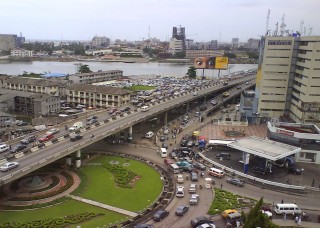Recently, Lagos, Nigeria received a certificate of admission into the network of 100 Resilient Cities in the world. This historic feat marked the beginning of Lagos state’s move to become more resilient. From all indications, Lagos wants to be more resilient to the shocks – catastrophic events like hurricanes, fires, and floods – and stresses, slow-moving disasters like water shortages, homelessness, and unemployment, which are increasingly part of 21st-century life. It has shown its potential for resilience in the past. One example that quickly comes to mind is the way in which it contained the outbreak of the Ebola virus and helped save Nigeria from a terrible epidemic.
Ventures Africa had an interview with Elizabeth Liz Agbor-Tabi, the Associate Director, for Cities and Practice management at 100 resilient cities. Elizabeth manages 100RC relationship with the cohort of African cities. She talks about the recent emergence of Lagos as one of the 100 most resilient cities, why Lagos was chosen and what it will take to make our cities more resilient.
Ventures Africa (VA): Can you tell us more about 100 Resilient Cities?
Elizabeth Liz Agbor-Tabi (ET): 100 Resilient Cities is an initiative that was pioneered by the Rockefeller foundation in 2013. It is a $168 million investment to help cities tackle the challenges of rapid urbanisation. We work very closely with cities, which include the element of the municipalities, individual citizens, and civil society, to build responses to rapid urbanisation and the challenges that come with it.
VA: Why was Lagos state chosen and what were the criteria for choosing Lagos state?
ET: We look for a number of things in the cities that we work with. We are looking for cities that are willing to embrace this holistic approach to resilient building, cities that understand that a transportation challenge isn’t limited to the department of transportation alone but it should also be looking at other components of well-being in a city. The city should be looking at economic opportunity and some of the social opportunities as well. We look for city leaders that embrace this framework and are willing to experiment with us in this regard.
VA: What was the resilient event that led to Lagos being chosen as one of the resilient cities?
ET: There are a number of challenges that Lagos state faced and some of the chronic challenges are around infrastructure failure or decline in infrastructure. This is a city that is rapidly urbanising and does not have the infrastructure to support that. There are opportunities here for Lagos to grow into a more resilient place. Most recently, there was the Ebola epidemic, which impacted a number of cities across West Africa with Lagos being no different. Lagos was the influential key player in the eradication of that epidemic and that is something that can be exported to some of our other member cities. We are really excited about this partnership; we are excited about connecting Lagos to the broader network and within Africa. This is done by creating a cohort of African cities that have similar challenges to Lagos from which they can be inspired as they embark on this resilient journey.
VA: What are some the benefit for Lagos state in this?
ET: We have four core offerings, so the first is the funding for a Chief Resilient Officer. We provide two years of salary support for the Chief Resilient Officer who will be locally based in Lagos and who will drive the resilience strategy. We also provide capacity and support to help the Chief Resilient Officer and the city to build the resilient strategy. We have a curated suite of services and tools that the city can use in building the strategy and the implementation of the initiatives that can come out from the strategy. There is also access to a broad network of a hundred global cities with diversity across size and influence and that Lagos can now play an active role in this peer-to-peer network.
VA: What will it take to make our city more resilient?
ET: That will be the contribution of each and every member of the society, which includes the stakeholders and partners that make up the city of the institution as well the community. Resilience isn’t built in a day and is going be very much a stakeholder-driven process. It’s going to require a lot of hard work and support of the Chief Resilient Officer.








